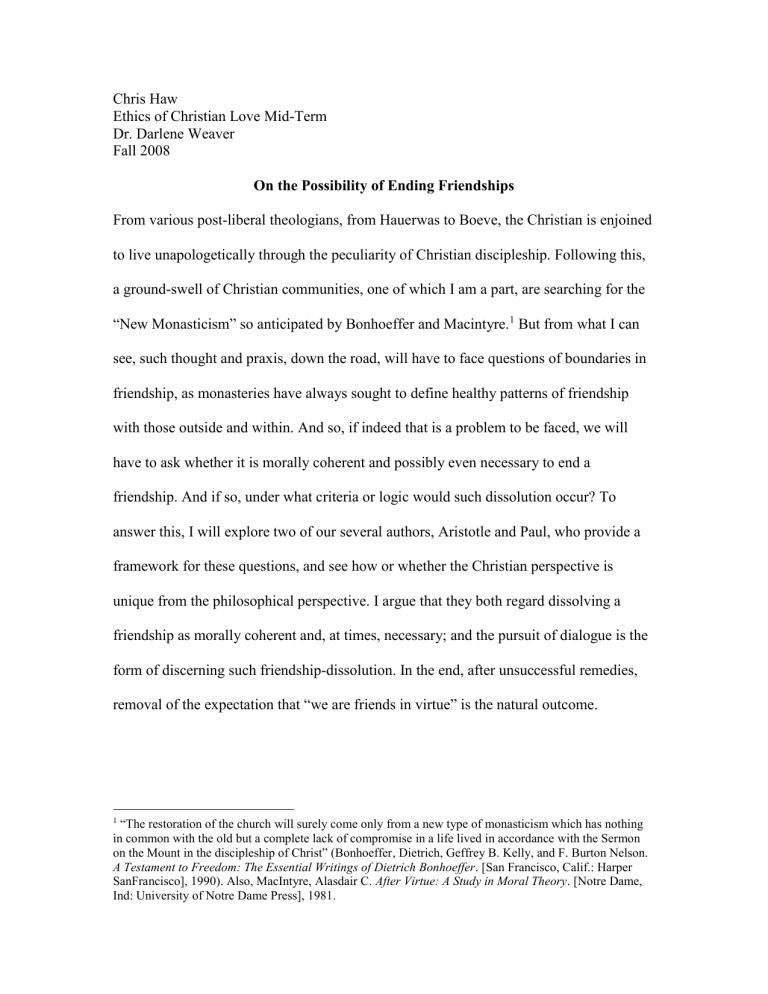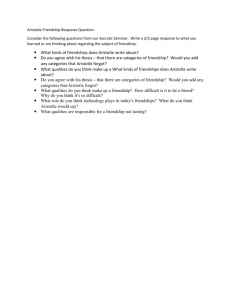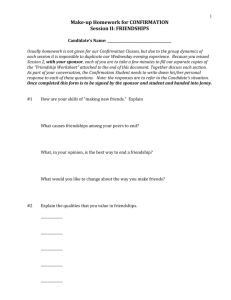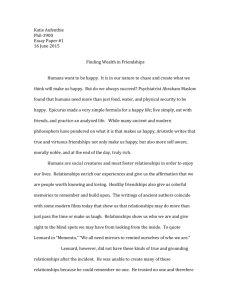Ethics of Christian Love

Chris Haw
Ethics of Christian Love Mid-Term
Dr. Darlene Weaver
Fall 2008
On the Possibility of Ending Friendships
From various post-liberal theologians, from Hauerwas to Boeve, the Christian is enjoined to live unapologetically through the peculiarity of Christian discipleship. Following this, a ground-swell of Christian communities, one of which I am a part, are searching for the
“New Monasticism” so anticipated by Bonhoeffer and Macintyre.
1
But from what I can see, such thought and praxis, down the road, will have to face questions of boundaries in friendship, as monasteries have always sought to define healthy patterns of friendship with those outside and within. And so, if indeed that is a problem to be faced, we will have to ask whether it is morally coherent and possibly even necessary to end a friendship. And if so, under what criteria or logic would such dissolution occur? To answer this, I will explore two of our several authors, Aristotle and Paul, who provide a framework for these questions, and see how or whether the Christian perspective is unique from the philosophical perspective. I argue that they both regard dissolving a friendship as morally coherent and, at times, necessary; and the pursuit of dialogue is the form of discerning such friendship-dissolution. In the end, after unsuccessful remedies, removal of the expectation that “we are friends in virtue” is the natural outcome.
1 “The restoration of the church will surely come only from a new type of monasticism which has nothing in common with the old but a complete lack of compromise in a life lived in accordance with the Sermon on the Mount in the discipleship of Christ” (Bonhoeffer, Dietrich, Geffrey B. Kelly, and F. Burton Nelson.
A Testament to Freedom: The Essential Writings of Dietrich Bonhoeffer . [San Francisco, Calif.: Harper
SanFrancisco], 1990). Also, MacIntyre, Alasdair C. After Virtue: A Study in Moral Theory . [Notre Dame,
Ind: University of Notre Dame Press], 1981.
Let us begin with Aristotle, as he, in his systematic exploration of the nuances in friendship, states the question clearly: when should friendships be dissolved?
2 He poses
2 the question in the larger context of assessing different of types of friendship—ones founded in utility, pleasure, and ultimately virtue. Utility is most unstable and problematic, as each friend is often looking for some gain and disappointed upon not receiving it.
3
And pleasure founds many relationships, as, for example, when one likes “a witty person not because of his character, but because he is pleasant to themselves.” 4 It is not surprising that these friendships, given the transient nature of utility and pleasure, are considered more likely to be dissolved.
5
And, if both parties know they are founded in pleasure or utility, it is not much of a scandal to dissolve such a friendship.
6
Given the shape of life, these two types of friendships are inescapable; they are not inherently bad—in fact, pleasure and utility are good 7 —but they are not complete until united the proper end of virtue.
Complete or primary friendship—or virtuous friendship—entails friendship via pursuit of the good . These friendships surely come with the benefits of utility and pleasure, but those ends are ordered within the greater foundation of virtue. We might say that these are friends “ in virtue .” The main ingredients for such a friendship are two virtuous people.
8
Maybe with a tinge of cynicism, or perhaps reading the future mind of
Christ and his “narrow gate”, Aristotle notes, “These kinds of friendships are likely to be
2 Aristotle, Nichomachean Ethics 10.6, 1165a37.
3 "Accusations and reproaches arise only or most often in friendship for utility" ( Ibid. 10.22; 1163a10).
4 Ibid. 9.32; 1156a14.
5 Ibid. 9.32, 1156a20
6 “With friends for utility or pleasure perhaps there is nothing absurd in dissolving the friendship whenever they are no longer pleasant or useful” ( Ibid. 10.61, 1165b1).
7 "For, it seems, not everything is loved, but [only] what is lovable, and this is either good or pleasant or useful." ( Ibid. 9.21, 115b10).
8 “Complete friendship is the friendship of good people similar in virtue; for they wish goods in the same way to each other in so far as they are good, and they are good in themselves” ( Ibid. 9 .35, 1156b8).
rare, since such people are few.” 9
The more a friendship is based in virtue (that is, those
3 faculties in pursuit of the good), the more stable it is, for the good is intransient and not moved by whim. It follows that these most stable relationships are less likely to be under the threat or necessity of dissolution.
But the realities of life are not so neat, and Aristotle knows this. For one, a major difficulty in our day is what we mean by “the good”—for this ideal seems to be subject to many interpretations. Perhaps another crucial difficulty here is the clause above, “when both parties know.” For the confusing part of friendships is not that there are different kinds, but that we confuse ourselves within their differing structures of expectation
—a concept to which we will return. Put most profoundly, “Friends are most at odds when they are not friends in the way they think they are
”—when they expect something unrealistic in relation to the persons in the friendship.
10
Beyond confused expectations, Aristotle broaches the question of friendshipdissolution through our propensity to change. He offers an example of a friend making a turn for the worse, saying that we cannot love the bad in them, but we must not rashly dissolve the friendship but push to “cure” their viciousness.
11
Aristotle’s solution to difference in virtue seems to be discourse —that one is enjoined here to work toward resolution through curing or setting right the vice-ridden friend. The vicious-friend passage seems to entail a formula for discipline that anticipates Paul’s ecclesial discipline
9 Ibid. 9.35, 1156b25.
10 Ibid. 10.61, 1165b6 (emphasis added).
11 Ibid. 10.63, 1165b13f. But we might ask: what condition aspires to the definition of “vicious”? Surely we all have different ideas of what is intolerable. Aristotle may not have answered this clearly, as his idea of good and virtue is fairly universal, in his mind. He states, “Actions of good people are the same or similar.”
Ibid. 9.35, 1156b17. Surely, this sounds troublesome for any who have trafficked in the post-modern conversations on difference . This uniform nature of virtue and goodness leads Aristotle to, what would be for many, a far too plain account of virtue, friendship, and difference; we love each other through sameness; “[T]he friend is another himself.” ( Ibid. 11.12; 1166a32; also, 11.61; 1169b5).
and Matthew’s process of rescuing a Christian friend. We must work so hard at this that
4 we could definitively say after the hard work of dialogue , the other is “incurable.”
It seems to me that Aristotle, in pushing to “cure” the friend—however politically incorrect—is not being “judgmental” or ceasing to love, but operating out of an age-old anthropology that we are not identical with our vices. We are thus not condemned by neighborly correction but supported by it. It is not a stretch to see in the Aristotilian-
Thomistic anthropology the age-old maxim, “love the sinner hate the sin.” 12
Differing from the scenario in which a friend becomes more vicious, Aristotle offers another example of change via a friend excelling in virtue. Can they put differences aside and still be friends? He writes, “Surely he cannot...how could they still be friends, when they neither approve of the same things nor find the same things enjoyable or painful?” 13 Aristotle seems to be addressing here the subtle anxiety we all must face— that we do not all approve of the same things .
14
Not similarly approving of what is good is a crucial manner by which friendships naturally diverge. But does this “of the same mind” standard leave us disappointed with all relationships short of similitude?
Aristotle draws upon his diversity of friendships model to leave a valve open for incongruence: “Now it is possible for bad people as well [as good] to be friends to each other for pleasure or utility, for decent people to be friends to base people, and for someone with neither character to be a friend to someone with any character.” 15
Again, it
12 Aquinas takes this up at length: Summa Theologica , II.Q25,Art.6.Ans; Q25.6.re ob 4; Q31.2.re ob 2.
13 Aristotle, 10.63;1165b23f.
14 The idea of sameness arises here again, that virtuous people will approve of the same things. “This sort of concord is found in decent people...they are practically of the same mind; for their wishes are stable, not flowing back and forth like a tidal strait.” ( Ibid. 11.32; 1167a5).
15 Ibid. 9.42, 1157a17.
is ok to have less-than-virtuous friendships, even for the virtuous person; but Aristotle
5 seems to indicate we are best served to know when they are such.
Lastly, Aristotle offers some consolation for dissolved friendships, that they might still involve cordial conduct, or some civil intercourse. He shortly (and obscurely) writes:
“[W]e should accord something to past friends because of the former friendship, whenever excessive vice does not cause the dissolution.”
16
What might be the case were
“excessive vice” the source of dissolution? Something along the lines of full-blown
Amish shunning? We are left guessing.
17
Like Aristotle’s virtuous friends, the Apostle Paul admonishes Christians to also
“be of the same mind.” But he offers some definition as to what this mind is: the like mind we are supposed to share is not a generally agreed upon set of virtues, but the mind we see in Jesus. In this mind, we are free from sin and “enslaved to God”— the most splendid kind of freedom . When we operate with one another through that freedom, we love “in Christ.”
But how can one have friendships with those “outside Christ”? His discourse in 1
Cor. 5:9-13 is perhaps more revealing of what he practically means by “love” than all the flowering language of the 13 th chapter:
I wrote to you in my letter not to associate with sexually immoral persons— not at all meaning the immoral of this world, or the greedy and robbers, or idolaters, since you would then need to go out of the world. But now I am writing to you not to associate with anyone who bears the name of brother or sister who is sexually immoral or greedy, or is an idolater, reviler, drunkard, or robber. Do not
16 Ibid. 10.64, 1165b35
17 Aquinas expands on Aristotle’s conditions of dissolution by insisting that we be ready to care for an exfriend’s basic needs (Q25.9.answer). Also, Q31.2.re ob 3.
even eat with such a one. For what have I to do with judging those outside? Is it not those who are inside that you are to judge? God will judge those outside.
‘Drive out the wicked person from among you.’ 18
We are left with many questions about what constitutes “association.” For did not Christ
6 eat (contrary to Paul?) with straying Israelites? Setting some of those questions to the side, the formula “bears the name” is helpful here. Paul’s “bearing” presupposes an us or a we that is different from modern liberal discourse of “society in general” or Aristotle’s boundary in the polis
(if indeed that is his “we”); not all “bear the name.” Paul believes there is such a thing as the people of God
—and this is different from “those made in the image of God.” This is the people called out of the nations in Abraham and continues in the ekklesia of the early Christians. These people have an inside and an outside . But what is particularly most interesting in the above passage is Paul’s reversal of the stereotypical
“tribal” urge (that we judge them and adore us ): we judge those inside . Commensurate with my above note, the inside is constituted by those who live toward one another “in
Christ,” 19 or those who “ call themselves a brother or sister.”
With regards to outsiders, to draw similarities to Aristotle, there is no confusion, at least on the Christian’s part, regarding the nature of the friendship. “Associations”— read, friends based in utility and pleasure—with those outside the church will be common for a Christian. But, to blend Aristotle here, we are naturally set to part ways with those
18 NRSV, Emphasis added.
19 Augustine carries on Paul’s modus operandi for the Christian: we must love one another in God .
Augustine refers to such friendships by saying, “no friends are true friends unless you, my God, bind them fast to one another through that love which is sown in our hearts by the Holy Ghost” (Augustine,
Confessions [New York, NY: Penguin Books, 1961], 75 [Book 4.4]).
Aquinas largely echoes the above definitions, using mediation phrases like “ in relation to God
”
(Q23.1.re obj 2), or fellow recipients of God’s grace (Q26.2.answer), or “fellowship in God’s good”
(Q26.4.answer), or loving neighbors for God’s sake, (Q23.5.re obj 1), or loving “on account of what he has of God” (Q25.1.re obj 1), or “through God” (Q27.4.answer).
7 who differently approve of what is Good. The person of Jesus Christ makes an even more concrete standard for what passes for “Good.” And for those claiming to share in this
Good, where unrepentant (i.e. after dialogue pursuit) sin remains, friendship is already naturally dissolving—for the friendship is mediated via that Good .
To interpret this through Bonhoeffer, the Christian knows her and the other’s status as “one who is forgiven by Christ” and thus is constrained to interact with others only through such mediation.
20 This is why Bonhoeffer interprets biblical love as always indirect ; we should not love through our own ego and desires, but through the mediation of what Christ has done and is doing to us. To relate to another outside of this nature is to inject dishonesty and potential harm. Fellow Christians are then regarded as those who, out of divine grace, happen also to be “in Christ.” Those outside Christ (who do not “ bear the name ”) are still treated with the love that Christ showed toward outsiders—and Paul believes we will undoubtedly always associate with such people—but are not subjected to the same structure of expectations or judgment.
Within the expectations of those “in Christ” we would seek to correct one another in the case of sin. And, like Matt 18’s end result or Aristotle’s declaration of
“incurability, the dissolution of friendship is natural when preceded with such an approach. But unlike Aristotle, dissolving such a relationship should never happen in personal scandal, but only with increasing levels of ecclesial accountability and visibility; otherwise dissolution could be bound in personal spasms of ego, anger, vendetta, etc. and not a discursive and loving search for the truth of each other’s status before God (or the
Good via pursuit of “virtue”)—in which miscommunications and errors could be
20 Bonhoeffer, Dietrich. Life Together (New York: Harper, 1954).
illuminated. In both Paul and Jesus, the dissolution of friendship never seems to be the
8 removal of love per se (however much, affection and interaction might change), but the removal of expectations. For through conversation, we have found another having left the disciplined Body of Christ. In such a case, for Paul, judgment has not increased, but in fact decreased.
In Paul’s Corinthian ethic and Matthew 18, by removing certain expectations from those outside the community, we have come to terms (in a way) with living in a world of unrepentant sinners, but we are not at peace with the “unrepentant” adjective abiding “in Christ.” That is, like Aristotle, we are content to have friendships in pleasure and utility, but we are at odds when we are not friends in the way we thought—that is through the virtuous pursuit of God in Christ.
Conclusion
Ending a friendship for the Christian, if it is not simply a breaking of the loose bonds of utility and pleasure, would make sense only if one’s friendships are “mediated in God.”
And if not all are equally related to God (or the Good via virtue),
21
some relationships will be restricted to mere social association and not shared enjoyment of the Good. For the friendships whose expectation structures are at odds, both Aristotle and Paul enjoin persons to pursue thorough rigorous dialogue the saving of that person from what appears to be the wrong or vice. I suppose a concern that should put all parties at pause is the mediating terms “love in reference God”; for we might ask, “whose God?” In reply, a potential question for further reflection would be whether it is more honest to say that we mean, “in reference to the Christian tradition.” For that is a visible and less confusing and
21 Aquinas: “Our neighbors are not all equally related to God [or, for Aristotle, the good via virtue]; some are nearer to Him, by reason of their greater goodness, and those we ought, out of charity, to love more than those who are not so near to Him” (Q26.6.re ob 2).
less hubristic claim. It means naming one’s participation in a peculiar religious tradition,
9 maintaining friendships through its expectation structure, while also having a generous allowance for others who “love in reference to their God
,” known via their tradition
.
And when the real differences of what we call Good are truly determined through long and painful discussion, we leave that person up to God’s judgment, not our own.





